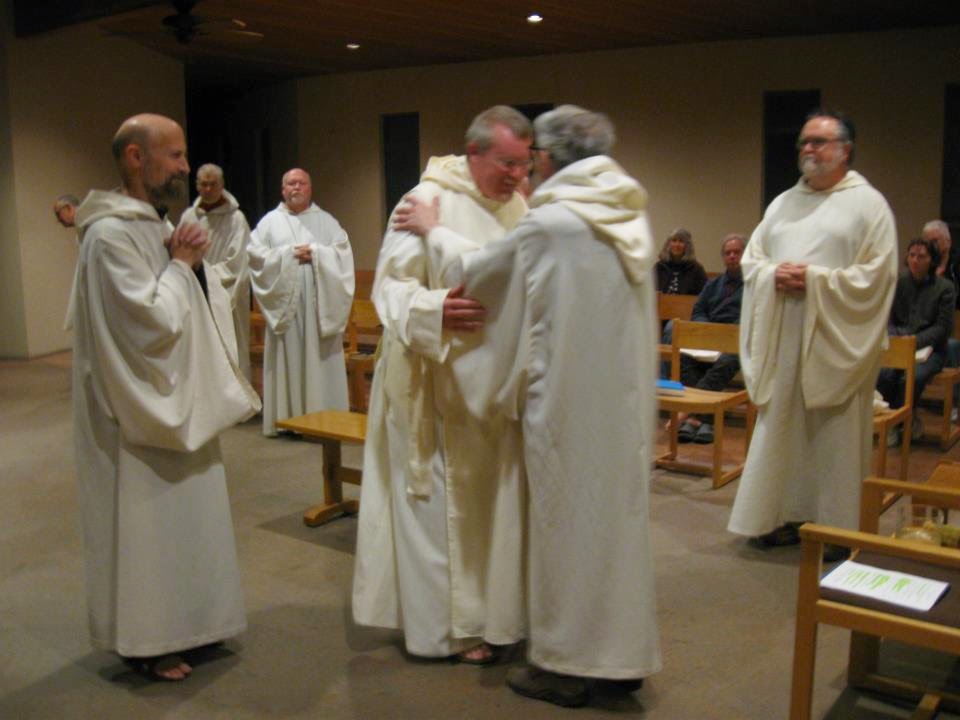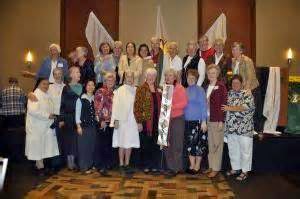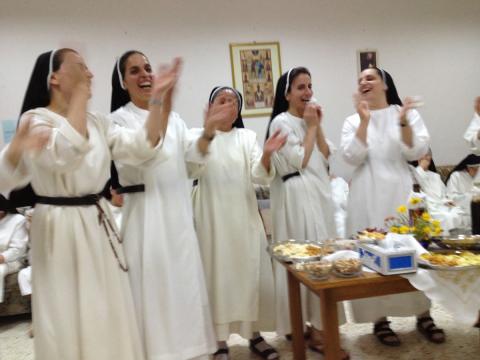 [[Sister, are you allowed to skip your Sunday obligation? A Catholic Hermit [link to this blog provided and omitted here] wrote that she is able to do this because it is God's will and (according to How Did Hermits Keep Their Sunday Obligation?) apparently an historical right of hermits. I don't understand how this works. Have hermits always been able to skip the Sunday obligation?]]
[[Sister, are you allowed to skip your Sunday obligation? A Catholic Hermit [link to this blog provided and omitted here] wrote that she is able to do this because it is God's will and (according to How Did Hermits Keep Their Sunday Obligation?) apparently an historical right of hermits. I don't understand how this works. Have hermits always been able to skip the Sunday obligation?]]
In general I do not skip my Sunday obligation, no, though yes, in some circumstances I am allowed to. If I am required to miss Mass on Sunday for some good reason (usually illness but occasionally the requirements of the silence of solitude and stricter separation) I ordinarily participate some other time during the week if that is possible. It is possible for a hermit who is publicly professed and who has assumed the additional canonical obligations of the eremitical life in the consecrated state to miss Sunday Mass because extended solitude and the call to eremitical solitude itself necessitates this; but remember that in such a case the hermit will ordinarily participate in a Liturgy of the Word with Communion in her own hermitage. This does not equate to participating in Mass but it does have a distinctly communal sense to it in the same way Communion brought by EEMs has the sense of continuing a Eucharistic celebration.
Moreover, because this is a matter of legitimate rights and obligations, she will only do so if she is allowed according to her Rule and with the general permission of her Bishop (given mainly in his official declaration of approval of her Rule). It will, in such a case, not be enough to simply list "solitude" as a value in one's Rule without specifying how this is worked out or at least indicating it will be effectively and sensitively combined with other important values (like a hermit's necessary Sacramental life!). Further, in specific instances, especially of very prolonged solitude, she will discuss the matter with her director occasionally to be sure her praxis here is prudent and that her solitary ecclesial vocation is not suffering from isolation from the faith community (this also happens at the involvement end of things when she will meet with her director or delegate to be sure her involvement is not detracting from her vocation to the silence of solitude).
In general, however, I have to say that even when I am living a more extended and intense physical solitude which involves seeing no one and not attending daily Mass at all, I will generally get to Sunday Mass at least once or twice a month --- not least because of the Eucharistic theology which sustains my life in the hermitage. While the obligations I assumed in profession and consecration may allow or even oblige me to live my physical solitude with an intensity and integrity which sometimes means missing Mass it does not EVER allow me to completely turn my back on my baptismal obligation or pretend the last 10 centuries never occurred.

The idea that missing Sunday Mass is an historical right of hermits is not really accurate. While regular attendance at the Sunday liturgy has been required or expected since the early days of the Church, this does not translate directly into what we know today as a Sunday obligation. Further, the blog article which is referred to (
How Did Hermits Keep Their Sunday Obligation? ) makes the following erroneous point: [[
This is why no ecclesiastical writer or hagiographer ever seems to think it is an issue that the saints and hermits are not able to attend Mass; they understand that their choice of life makes it impossible to fulfill the Sunday obligation and that in these circumstances, that decision is justified in the eyes of God and the Church.]] In point of fact St Peter Damian (11-12C) and Paul Giustiniani (16C) both wrote about the importance of attending Mass and receiving Communion regularly (though they were not addressing the idea of Sunday obligation in their day). Giustiniani in particular addressed the issue: [[
The second kind of hermits are those who, after probation in the cenobitic life, after pronouncing the three principal vows and being professed under an approved Rule [note well the structure and formation required here]
, leave the monastery and withdraw to live all alone in solitude. . .Such a life. . . is more perfect than the cenobitic but also much more perilous. It permits no companionship but requires that each be self-sufficient. Therefore it is no longer permitted in our day. The Church now orders us to hear Mass often, to make our confession, and to receive Communion. None of those can be done alone.]] Dom Jean LeClercq,
Alone With God, "Forms of Hermit Life" (an alternative translation is provided below***)
***
[[ Indeed this solitary way of life was considered more perfect (even if less safe) than that of the cenobites at the time when no law of Holy Church forbade living a life in complete solitude. But at the present time ecclesiastical laws oblige all the Christian faithful . . . to confess their sins often, to receive Holy Communion, and to celebrate or attend Mass frequently. . .Now since all these things are hardly possible in this [entirely solitary] kind of life, it would seem to be wholly prohibited. So it is held to be less safe (or rather completely illicit) for a Christian to attempt it, or more exactly, to persist in it.]] Paul Giustiniani,
Rule of the Hermit Life. "Three Types of Hermits"
In today's Church the Sunday obligation obliges every person
unless there is a truly good reason or some exception made by a legitimate superior.
The obligation is a priority in an authentic faith life and requires Catholics make it a priority unless they have a really good reason or the aforementioned exception is made. One cannot argue (as it seems to me the USC blogger argued) that missing Mass is fine so long as it was not the primarily intended end. (It might not be a sin in such a case but it is not really okay.) Neither then does this mean a lay hermit (meaning a hermit without PUBLIC vows or canonical initiation into the consecrated state with its commensurate rights and obligations) can simply decide on her own, "Oh, traditionally hermits never went to Mass because they were called to solitude, so neither do I need to attend Mass! or "I have chosen solitude first so missing Mass (the secondary consequence) is no problem," or even "I just don't "fit in" so God is calling me to something else and I am dispensed." A lay hermit (e.g., the person whose blog you first referred to)
is bound by her baptismal obligations. These are legitimate obligations (binding in law) and without public profession no other canonical obligations have been assumed nor do they potentially modify these fundamental obligations. Once again the importance of standing in law becomes very important.

Every eremitical writer who has considered the relation of the hermit to the Church and the danger of the independent solitary hermit is clear that too often this way results in illusion and delusion. It results in isolation more often than it does in genuine solitude and it can lead a person away from active and integral participation in the Church. When Paul Giustiniani writes about the three kinds of hermits he says:
[[To the first type of hermit belongs those who take no vow of poverty, chastity, or obedience, [here he means public vows under a legitimate superior] do not have an approved rule, and are not subject to any teaching or discipline. . . They do not follow any regular discipline [referring again to a rule and superior], but only their own feelings, and they are not directed by the teaching officer of any superior, but by their own opinion. And so, by these very things, they make it clearly understood they still keep faith with the world. . . .For Saint Benedict, who calls these [hermits] sarabaites if they reside in a definite place, or gyrovagues if instead they move often from one place to another, plainly defines them as having the most disgraceful and miserable style of life. These . . . are called acephalous, that is, headless. The sacred canons of the Church do not sanction this kind of life. Rather, they censure it.]] In any case if a lay hermit (even one with private vows!) wishes to remain a good Catholic she will keep those laws of the Church she embraced in accepting Baptism.

In many of the posts I have put up here I have written about the ecclesial nature of the diocesan eremitical vocation, the covenantal nature of genuine solitude, the distinction between isolation and solitude, the importance of canonical standing in order to create stable ecclesial relationships which allow one to live this vocation with integrity and not delude oneself, and finally, the importance of friendships and regular participation in a parish community. In somewhat different ways, the same is true of the lay eremitical life. The facile conclusion that God wills a solitary hermit who claims on their own the title "Catholic Hermit" to simply forego reception of the Sacraments, isolate herself entirely from a local faith community, live without adequate spiritual direction nor under the authority of any legitimate superior simply underscores the importance of all these points; it also underscores the danger Saints like Peter Damian and eremitical reformers like Paul Giustiniani (who profoundly loved and understood the call to eremitical solitude) wrote about. In Paul Giustiniani's time we have seen he concluded that solitary hermit life was no longer licit or viable; the significant solution and model he proposed was a laura of hermits. Today we also have canon 603 which, while governing solitary eremitical life, does so with mainly the same safeguards Paul Giustiniani outlined. The hermit's relationships with diocese and parish ordinarily serve the place of a laura, at least in the sense of providing an intimate ecclesial context for one's solitude and in reminding us that the hermit's life is never one of isolation from the community of faith. If what this lay hermit wrote does not make sense to you then that is understandable; it is in conflict with the Church's own understanding of the way the solitary eremitical vocation must (and must NOT) be lived today and it is in conflict with classic writers on the eremitical life since at least the 11th century.
While I have cited the Camaldolese Benedictine constitutions on requirements for recluses it is important to cite what Paul Giustiniani says about those living reclusive lives. After commenting on the importance of the laura (a colony of hermits) for providing the advantages and security of community and allowing solitude he says of the recluse, [[but he will never be released from the rule and constitutions of the hermits or from the authority of and obedience of the superior. So too he will never lack fraternal assistance on those occasions when, for the observance of ecclesiastical norms, the ministry of another is required.]] Meanwhile, in his "Instruments of the Eremitic Life" Giustiniani lists celebrating Mass with spiritual joy or hearing it with devotion (#20), receiving Holy Communion with great reverence (#28), maintaining appropriate observance of common life (#33). For C 603 hermits these prudent requirements translate into relationships with a parish community and active participation there --- even if that is largely limited to Mass attendance only. For lay hermits who are in no way relieved of their ordinary Catholic obligations by accepting and being charged with other legitimate ones, this is even more the case.

Solitude (that is, eremitical solitude which describes solitary communion with God lived for the sake of others) is recognized in canon law as a very high value but this is only true when it is understood to truly exist in the heart of the Church. In my own life the "silence of solitude" (which is a goal and gift to the Church as well as an environment) might well require that I miss Sunday Mass for a period of time but there are sufficient structures (Rule, superiors, canons), relationships (superiors, faith community, director, pastor, etc), prayer (including the LOH and liturgy of the Word with Communion), and oversight (delegate, Bishop, director) to assure this does not slip into isolation or become willful, personally eccentric, or simply illusory (or delusional). Maintaining one's balance between physical solitude and participation in the Church's concrete faith life allows some flexibility and creates some tensions but one must be able to say, no matter what,
that one is living a genuinely ecclesial faith life. For the solitary (c 603) hermit or for the lay solitary, a regular Sacramental life celebrated with one's brothers and sisters in Christ is undoubtedly part of doing so.
(See also,
Hermits and Eucharistic Spirituality for a more general discussion of part of the way hermits resolve the issue of competing legitimate obligations in their life. This piece deals with developing a truly Eucharistic spirituality even when one cannot always get to Mass.)
 [[Hi Sister Laurel, in your next to last post you referred to LOH along with liturgy of the Word with Communion. What is LOH? Do only hermits do it?]]
[[Hi Sister Laurel, in your next to last post you referred to LOH along with liturgy of the Word with Communion. What is LOH? Do only hermits do it?]] Monastics tend to pray at least five of the hours each day and many do all seven. I tend to do 3 or 4 of the hours during the Spring and Summer months and 5 during the Winter months when I am inside even more. (I also do more of the hours when I am ill, for instance because I do less of other forms of prayer or lectio, etc.) Otherwise, I find praying more of the Office fragments my day more than it assists it to be prayer. My personal favorite hour is Compline (which comes from the Latin for "complete" or completion). If someone is just starting to pray Office I tend to suggest they start with Morning Prayer (Lauds) and end their day with Compline. As one gets used to doing this one can add other prayer periods. This enables one to get used to really praying an hour before jumping into more of them and also to accommodate the other parts of one's schedule that are still quite demanding.
Monastics tend to pray at least five of the hours each day and many do all seven. I tend to do 3 or 4 of the hours during the Spring and Summer months and 5 during the Winter months when I am inside even more. (I also do more of the hours when I am ill, for instance because I do less of other forms of prayer or lectio, etc.) Otherwise, I find praying more of the Office fragments my day more than it assists it to be prayer. My personal favorite hour is Compline (which comes from the Latin for "complete" or completion). If someone is just starting to pray Office I tend to suggest they start with Morning Prayer (Lauds) and end their day with Compline. As one gets used to doing this one can add other prayer periods. This enables one to get used to really praying an hour before jumping into more of them and also to accommodate the other parts of one's schedule that are still quite demanding.





















































.jpg)























